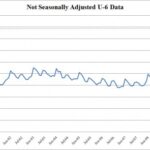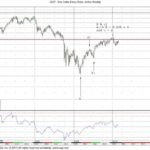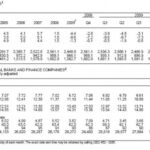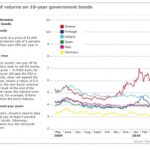Febbraio 28, 2010 EcoAnemia
Il futuro che ci attende
[…] Prende forma il piano di Francia e Germania per salvare la Grecia con un aiuto di circa 30 miliardi di euro – pari a circa 45 miliardi di franchi – anche se i tempi e i termini del salvataggio restano incerti.[…]
Questo è quanto riportano questa sera i principali mass-media, che rimbalzano la seguente news pubblicata oggi dal WSJ :
[…]A plan led by Germany and France to bail out Greece with aid of as much as €30 billion has begun to take shape, Greek officials and other people familiar with the matter say, but the timing and terms of any rescue remained unclear.[…..]
In verità non pare proprio così :
[…]Former ECB chief economist Otmar Issing provides a similar view: “My preference is that you turn on the IMF, since Greece is a member of the IMF, not the European Union”, said the current chairman of the Intergovernmental Commission for the financial architecture for information in this newspaper recently the Europe Committee of the Bundestag.
The monetary union was not a state, Issing argued, but a community of sovereign states. If you could help Greece, other countries refuse to help little, “[…]
Ma che il default greco – quantomeno nei termini classici – lo si vorrebbe evitare , lo dimostrano anche le seguenti dichiarazioni :
[…]A bankrupt government would meet not only the euro zone, but shaking the entire global financial system. After the video of Obama, Merkel and Brown said the spokesman for the U.S. president, Robert Gibbs, Obama was convinced that the EU would respond “appropriately and effectively” to the crisis.
On the foreign exchange markets, the continuing uncertainty sparked a new wave of speculation against the euro. According to the U.S. inspection CFTC, the number reached bets on a falling euro share price, a new record. This year, the euro against the dollar has lost about ten percent of its value.[…]
In verità, queste sono solamente chiacchiere, i numeri e soprattutto i nomi di coloro che stanno andando corti contro € sono ben noti, essendo sempre i soliti.
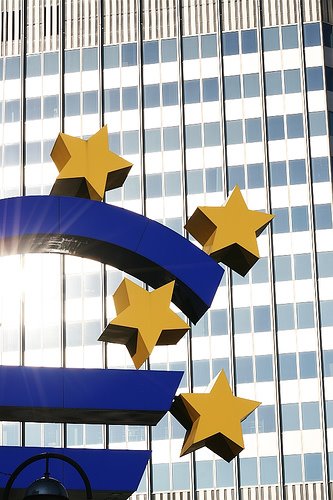
Ed infatti :
[…]Despite expectations elsewhere that speculators may be unwind their Euro short exposure, the CFTC’s Commitments of Traders report indicated that for the week ended February 23, futures only speculative shorts hit an absolute all time record of -71, 623, an increase in net short exposure of over 12k compared to the Feb 16 position of -59,422, a massive 20% week over week increase.
Another observation: the fans of the JPY are declining materially, with net longs collapsing by 12,195 positions, to just above breakeven, at 1,717.
The GBP was the second most hated currency in the past week, with a net positioning of -64,647, an increase in net shorts of 5,409 weekly.
The only currencies, which saw net long positions were the AUD (+11,989 to 38,992 and the CAD 4,996 to 28,421), and, of course, the dollar, whose aggregate positioning in nominal terms increased by 20%: from $8.14 billion to $10.28 billion.[…]
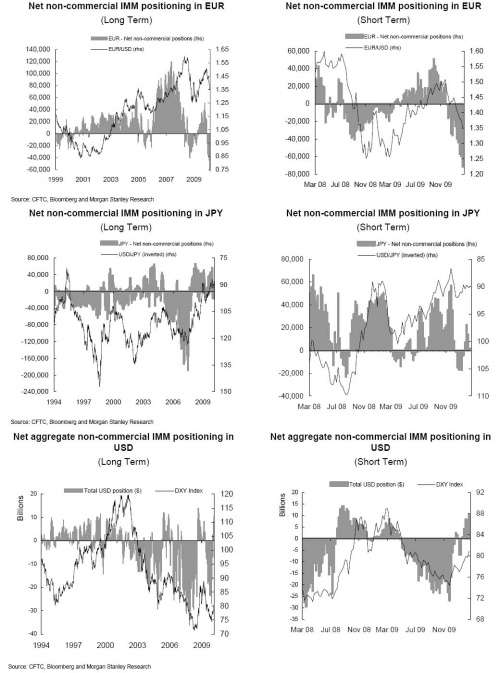
Tutte situazioni ben note alla sottoscritta, ma giova sempre ricordarlo.
Ma attenzione, perchè sin dalla giornata di venerdì ci sono stati dei movimenti secchi e violenti proprio nel cambio €/$, che resta non solo il più volatile, ma quello maggiormente a rischio speculazione.
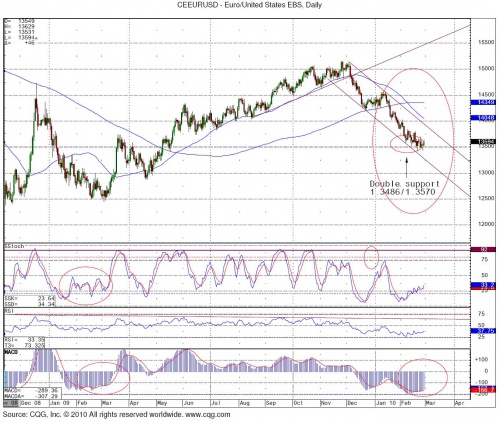
Il destino nel medio periodo dell’€ è naturalmente verso sud, ma ora come ora occorre molta cautela, mi attendo un violento movimento dovuto ad improvvisi short covering anche su news che poi si rivelano completamente fasulle, tipo quelle che hanno iniziato a girare venerdì pomeriggio :
[…]Germany is considering buying Greek bonds through state-owned lender KfW Group, German lawmakers said today.
KfW is preparing measures that are part of a European plan to grant Greece as much as 25 billion euros ($34 billion) in aid should the need arise, said four lawmakers, who spoke on the condition of anonymity because the information is confidential.
KfW’s purchase of Greek bonds, backed by German government guarantees, would be an emergency measure as it risks inviting investors to speculate against other euro region countries, the lawmakers said.
No decisions have been taken yet, they said.[…]
Naturalmente una news completamente falsa, così come questa :
[…]The Chief Executive of Germany’s Deutsche Bank AG (DB) Josef Ackermann is in Greece to meet with Greek government officials, the bank confirmed Friday.
The meeting with Greek officials is part of a normal business trip to the country, the bank said. Deutsche Bank wouldn’t provide details on the nature of the discussions.[…]
In effetti, un recente sondaggio proposto in Germania su cosa ne pensassero del possibile aiuto tedesco nel salvataggio della Grecia, ha dato un risultato talmente evidente che si commenta da solo, così come ha fatto il settimanale tedesco Focus.

Di certo non il massimo dell’eleganza, ovviamente, ma riassume bene il sentimento del paese.
Naturalmente le proteste elleniche non si sono fatte attendere :
[…]In a statement Friday, Greece’s umbrella Federation of Greek Consumers, Inka, referred to Germany’s war record and also the magazine article in calling for Greeks to boycott all German products and shops.
“In a sign of protest Inka…calls on all citizens of the country to boycott all German products and shops even if they say they are sorry,” the statement said.
“The distortion of a Greek historical statue of beauty and civilization, at a time when [the Germans] were eating bananas in the trees, is unacceptable and inexcusable from later civilized peoples,” the statement added.[…]
Questo fatto fa capire quanto l’umore non sia dei migliori e che nell’UE non ci sia proprio nessuno spirito comunitario.
Bene, l’epicentro della crisi per ora è in Europa, ma gli USA non se la passano certo meglio :
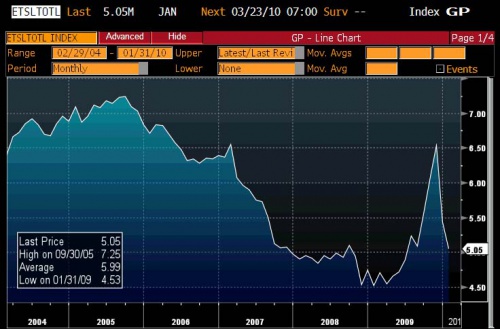
[…] Existing home sales came in at consensus busting (to the downside) SAAR of 5.05 million, a 7.2% drop from December’s 5.44 million, which in turn was 16% lower than November 6.49 million. January consensus was for 5.5 million.[…]
Una serie di notizie sempre peggiori.
Ed infatti, il problema non è tanto il possibile default (totale o parziale) della Grecia, ma un altro : il debito accumulato negli ultimi anni andato completamente fuori controllo in quasi tutti gli stati occidentali od in qualche modo legati a doppio filo con le loro economie (USA, UK, Giappone, Europa).
E siccome abbiamo in questo momento tassi di interesse vicini allo zero, tutti questi stati andranno incontro al default nel momento in cui i tassi di interesse risaliranno e non sarà possibile rinnovare i debiti in scadenza.
E’ quindi lecito attendersi in 5 o 10 anni un’ondata di default in cui anche l’Italia potrà essere coinvolta.
Tutti gli sprechi nella gestione degli stati ed i deficit abnormi determineranno conseguenze da pagare molto pesanti per tutti noi.
I primi segnali arrivati dalla Grecia confermano questo scenario, e la quasi certezza di un futuro davvero molto difficile per tutti i paesi occidentali.
Si è (finalmente) scoperchiata la pentola del rischio connesso ai debiti pubblici nazionali ,con un primo forte segnale.
Non è un problema che si può risolvere stampando denaro, come fatto dagli USA per il proprio sistema bancario in bancarotta.
Questo è solo un passaggio di un processo più ampio e che mostra la fragilità e il non senso del sistema finanziario, politico e sociale costruito nel dopoguerra.
Ma la grande massa della gente – al solito – capirà tutto questo solamente quando non potrà più uscirne.





